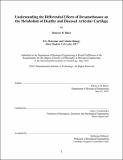Understanding the Differential Effects of Dexamethasone on the Metabolism of Healthy and Diseased Articular Cartilage
Author(s)
Black, Rebecca M.
DownloadThesis PDF (14.34Mb)
Advisor
Grodzinsky, Alan J.
Terms of use
Metadata
Show full item recordAbstract
The glucocorticoid drug Dexamethasone (Dex) has been proposed as a potential therapeutic to treat or prevent post-traumatic osteoarthritis (PTOA), a disease affecting millions of Americans without a disease-modifying drug. However, current reports on Dex efficacy often disagree on the effects of Dex on cartilage tissue homeostasis.
The first part of this thesis uses proteomic analyses of a bovine ex vivo cartilage explant monoculture model of PTOA progression to identify inflammation-induced catabolic processes associated with disease progression that were attenuated by the addition of Dex. Some of the matrix fragments and inflammatory cytokines appear to be novel, promising disease biomarker candidates. Dex had an imperfect rescue effect on the observed dysregulation of anabolic and chondroprotective processes.
The second part of this thesis expands the ex vivo cartilage explant monoculture PTOA model to use human donor knee cartilage. Proteins released into the media were clustered by the kinetics of their release over three weeks. This analysis further details the classification of biomarker candidates by their timing of release from cartilage, which was compared to the timing of proteins reported to be in patient synovial fluids after traumatic joint injuries. Experiments here revealed that Dex restored the kinetics of release to many matrix components.
The final part of this work combines both healthy human ankle cartilage and bone in a novel osteochondral PTOA model that incorporates disease-relevant tissue crosstalk. Across seven human donors, proteomic analysis of culture media and cartilage tissue revealed that catabolic disease effects such as matrix breakdown and sGAG loss were attenuated by Dex, as well as the dysregulation of bone metabolism with disease but not Dex treatment. Regression analysis was used to find disease-specific peptide biomarkers by regressing individual peptide abundances against sGAG loss. Regressing protein abundances against Dex rescue effects on sGAG loss then identified an association of pro-inflammatory humoral proteins and apolipoproteins that were associated with lower donor-specific Dex efficacy.
Taken together, these results demonstrate the anti-catabolic effects of Dex in human cartilage and osteochondral PTOA model systems, with only minor off-target effects on anabolic processes and identify methods of better predicting disease and Dex responses.
Date issued
2022-05Department
Massachusetts Institute of Technology. Department of Biological EngineeringPublisher
Massachusetts Institute of Technology